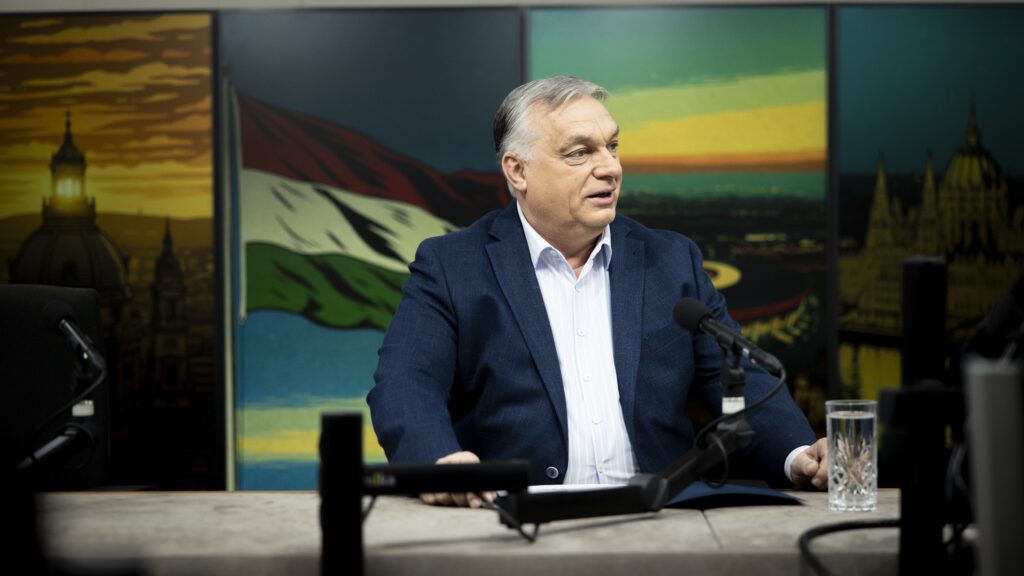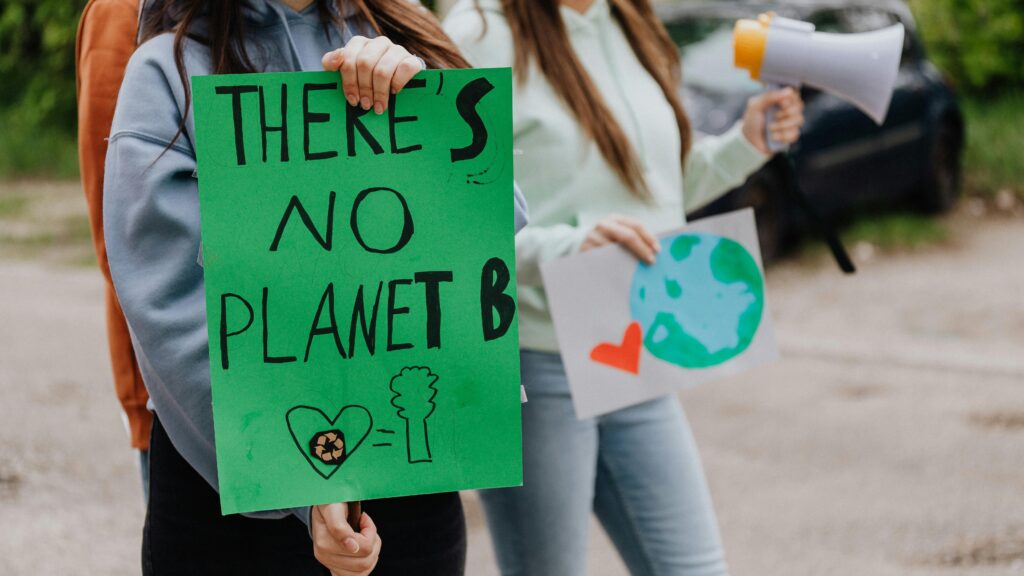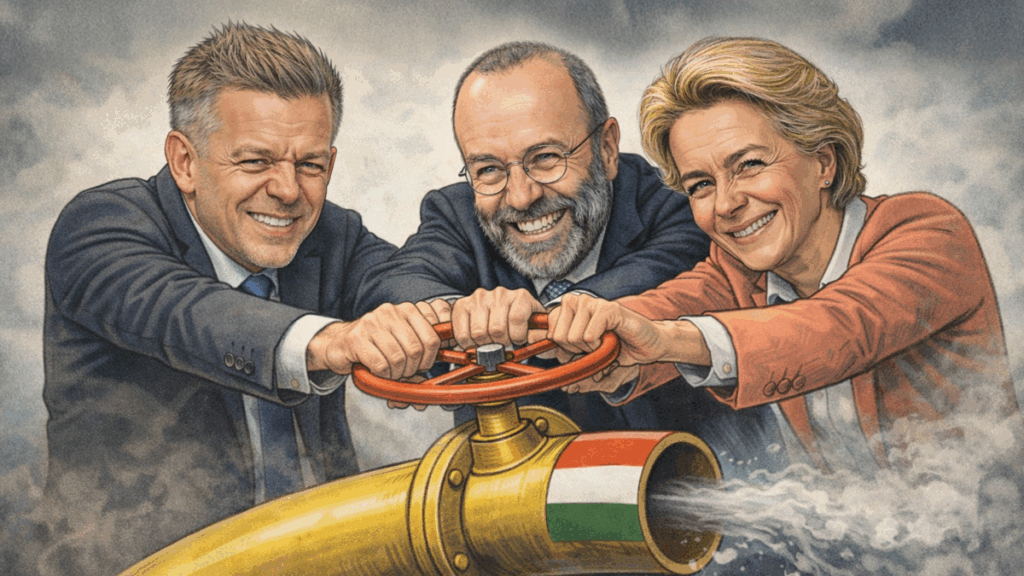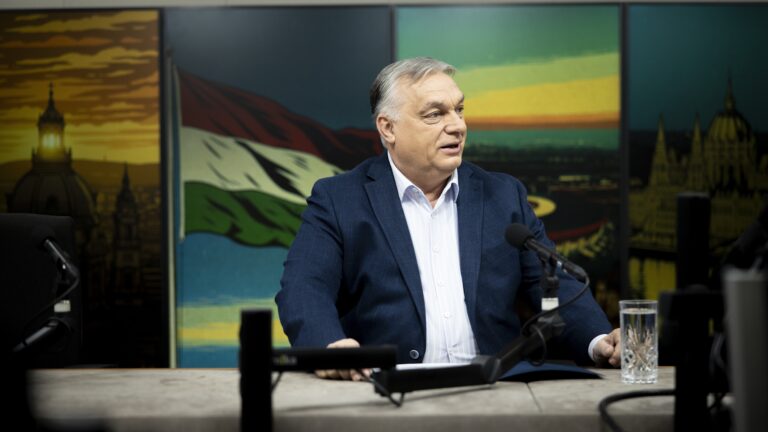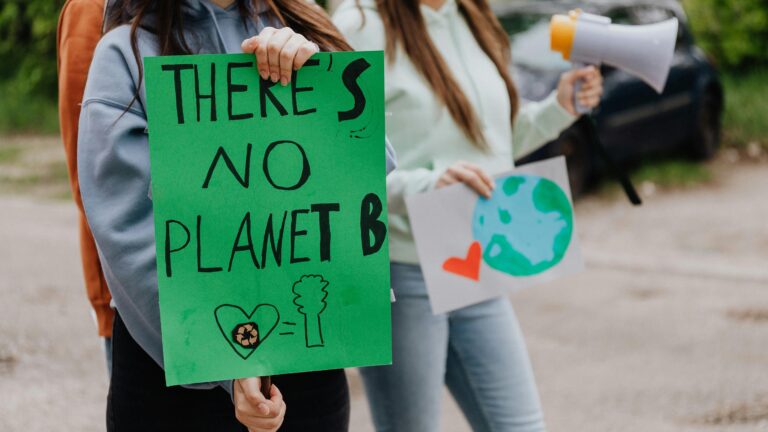Attila Steiner is State Secretary for Energy at the Ministry of Energy in Hungary. Prior to his current position, he was State Secretary for the Development of Circular Economy, Energy and Climate Policy at the Ministry for Innovation and Technology, and State Secretary for EU Affairs at the Ministry of Justice. Previously, he worked as Deputy State Secretary for EU Relations within the Prime Minister’s Office. He served as a political advisor in the Prime Minister’s Office and earlier in the European Parliament. He is a graduate in economics from Corvinus University in Budapest.
***
There are two European member countries still stuck with Russian energy. One of them is Slovakia, the other one is Hungary. What’s the reason for that?
My first comment is that we are not the only ones. Not only do these two countries purchase Russian gas, but in the form of LNG, there are also several Western European countries that purchase it, even more than these two countries. And actually, if you consider the data from last year, there was an 18 per cent increase in Russian gas purchases. In the meantime, Hungary reduced its imports by more than 20 per cent. It’s the data from 2024 compared to 2023.
Secondly, when it comes to energy, geography and physics matter—and these two countries, Slovakia and Hungary, are landlocked countries in Eastern Europe. Basically, we can purchase gas through pipelines because we don’t have any sea access. Many other countries do. They’re in a better position because they can buy LNG, if they have the necessary facilities on the seashore — but we don’t have those. So we can only purchase gas through pipelines. And pipelines have physical constraints; they have a maximum capacity. We can’t just switch supply routes from one direction to another, because there are a lot of bottlenecks. There’s not enough pipeline capacity to substitute Russian gas—there’s a bottleneck in Romania, in Bulgaria, in Croatia, and in the Western European pipeline network. So, it’s easy to say we should diversify away from Russian gas, but there are no physical alternatives at the moment. Those pipelines need to be developed—and that takes time. Not a couple of months, but a couple of years. And those developments wouldn’t be done by us, but by our neighbours.
I found an analysis of the Hungarian energy supply on the Atlantic Council’s website. The report was published by the Center for the Study of Democracy (CSD) and the Centre for Research on Energy and Clean Air (CREA). These two institutions found that Hungary and Slovakia could purchase alternative supplies, non-Russian oil via an alternative source, like through Croatia, the Adria pipeline, and non-Russian gas in the form of LNG, liquefied natural gas, through many LNG ports in Europe, like Germany, Italy, Greece, and Poland. Can you comment on that?
This sounds great in theory, but let’s face the reality: physics and pipeline capacities. Of course, you could purchase more energy through Croatia; however, now the capacity of the Croatian LNG terminal is fully utilized. The Croats will expand the capacity—this is planned. They promise that it will happen by 2027, but then they have to also develop the pipeline capacity towards the Hungarian border, because this pipeline cannot deliver more gas currently, as it is already running at full capacity. So a lot of investments are needed in Croatia. Western LNG terminals—it sounds great, but those terminals are currently contracted and utilized. There are valid contracts. And capacity booking in the gas market is for 2–3 years. We have to book the capacities which will be physically delivered to us.
‘There is not enough pipeline capacity to substitute Russian gas—there’s a bottleneck in Romania, in Bulgaria, in Croatia, and in the Western European pipeline network’
What is the way out, then, in this situation? Because there were some years, from the beginning of the Russian war, to think about it.
We have already diversified. We purchase 1 billion cubic metres of LNG from Croatia. We concluded a contract with a Turkish company and one with the Azerbaijan gas company, Sokar. The problem is that these are limited quantities because we can deliver only limited quantities physically to Hungary, due to the bottlenecks in the international gas pipelines.
What about the Azeri gas field that Hungary purchased?
I think it’s a very good way to show that we try to diversify. That’s why we purchased 5 per cent in one of the largest gas fields in the world. This is located in Azerbaijan, called the Shah Deniz field. However, at the moment, it’s more of a financial investment only, because we can’t physically deliver gas to Hungary due to bottlenecks in Bulgaria and Romania. So, that’s why it serves as a perfect financial hedge—if prices go up, at least we have some revenues. Of course, the best solution would be to physically access that gas, but that will take years to become a reality.
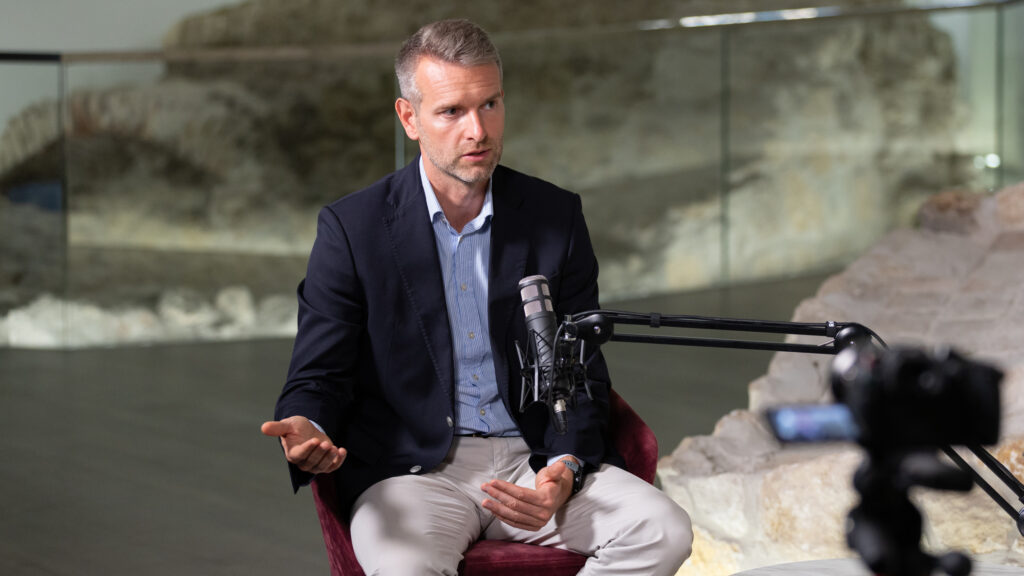
Western European countries claim that since the war started in 2022, Hungary has partly financed the Russian war machine by buying Russian oil and gas. Is there some truth in it, or not?
Ok, so what is the alternative? To shut down the country and to cancel further energy supply? I don’t think that is a real alternative. We cannot choose that. Currently, this energy is available in this region. Of course, if all of those investments which are promised by all of our neighbours are realized, then we will be in a position to diversify and to access other sources of gas. But in the short term, this is not an option. So that’s why I think it’s not really the question, because we cannot do that. Shutting down the Hungarian economy—that cannot be the programme of a responsible government.
On the other side, Western countries are also purchasing Russian gas—maybe not directly, but through intermediaries. So, they’re also financing the war. If you buy crude oil from India that originates from Russia, or if you purchase Russian gas in the form of LNG, then it’s essentially the same situation. So, I think it’s not an honest discussion. We’ve pointed out that while we have pipelines, we don’t have any short-term alternatives to switch away from them.
Will this dishonest practice of Western countries purchasing oil from Russia be finished in January 2028, when the Commission plans to phase out all purchases of Russian energy?
I don’t think they will terminate it just because of how this proposal looks. You have to justify that it’s non-Russian gas. But if you get papers from the Indians, for example, stating that it’s Indian crude oil, then you purchase it—and companies are motivated to buy it because it’s cheaper. That’s why it’s happening: because it’s less expensive. These companies want to make a profit, and that’s why they purchase Indian crude, or Indian refined products that are actually refined from Russian crude.
‘Western countries are also purchasing Russian gas—maybe not directly, but through intermediaries’
Donald Trump imposed new tariffs on India for buying Russian crude oil. Do you expect that Hungary could get into the same situation? If Trump cannot manage to secure a deal with President Putin, he might ask Hungary to stop buying Russian oil. What would Hungary do in this scenario?
You know that was also a question within the European Union itself, and that’s why we managed to get exemptions from the sanctions, because we could justify that we don’t have other option currently to purchase such a large quantity of alternative gas. You could also see in the news that Ukrainians attacked the Druzhba pipeline several times, and that was not endorsed by President Trump at all. I think nobody can expect us to shut down the economy. I think a realistic approach shall be there.
I read an opinion article about the Druzhba attack. According to the writer, this attack was not only a message to Putin to stop the war, but a warning to the Hungarian government to stop trading with Russia. Did you interpret the message this way?
I think it was very obvious that this was the purpose. Even President Zelenskyy made some reference to it. We considered it a targeted action against Hungary because Ukrainians are aware of the pipeline, its impact, and how much our supply security depends on it. So I think it was really targeted. And it’s quite obvious that if they do it again, they would like to put pressure on Hungary.

What would be your government’s answer if the attacks continue?
You know we would consider it an attack on a critical infrastructure which is supplying two European Union member states. According to our understanding, it would mean an attack against the European Union. And Ukraine would like to join the EU. So, there is a big discrepancy between the dreams and the reality, what they do, and how they could expect us to support them in such a case—their accession to the European Union. I think this is a big question mark.
A theoretical question: if the Druzhba pipeline were eliminated, what would Hungary do? How many supplies do we have to survive the situation?
We also have some domestic production still, but this is around only 10 per cent or even less. We have an alternative pipeline through Croatia—the Adriatic pipeline—which has never been tested for a longer time, to see whether it can supply Hungarian and Slovakian refineries. They always claim they can supply, but they only have paper and test results for one or two hours, not for months or years. So I think this is a big challenge. And according to the sanction exemptions, we could also get access to Russian crude oil through that pipeline. That would mean a much more expensive access to Russian crude, because it’s not the shortest way. You have to put it on the sea, then you have to use this very expensive pipeline. This is one of the most costly pipelines in Europe, because the Croats doubled the tariffs when the war started; they knew that this would be the only backup. So, on business terms, if we have the Druzhba and the Adriatic pipelines, it’s very easy to decide which to choose, because the Druzhba pipeline is much cheaper.
‘An attack on a critical infrastructure which is supplying two European Union member states…would be an attack against the European Union’
However, we have to purchase some amount of non-Russian-originated crude, because otherwise we couldn’t export. However, switching to non-Russian crude would significantly reduce the ability of the refinery. There is a huge difference in quality, and then I would expect a significant drop, like a 20–40 per cent drop in the refinery’s output. It means less gasoline, less diesel. So we have to purchase those products from neighbouring countries, through railway, through many logistical challenges, and that means a very significant price increase.
You consider the Russian companies reliable partners to trade with, right? What about the long-term contracts with them? When will they expire?
Yes, we consider Russian supplies reliable, since this is our experience. What has proven unreliable, however, are some Western companies. For example, in Romania, we contracted 3 billion cubic metres of gas annually, because Romania is developing the so-called Neptun Deep project, which is a gas field in the Black Sea. But the contract was unilaterally terminated. So for us, those companies were not reliable. Long-term contracts still run for several years. In the case of gas, it’s still on for ten additional years. I think the big challenge is that, if the Brussels proposal to fully cut Russian fossil fuel imports happens, Russian companies will go to court and initiate a case about why those European companies unilaterally terminated the long-term contracts. And I very hardly see any safeguards in such a situation. If the court decides in favour of the Russians, that could mean several billion euros as a penalty, which shall be paid to the Russian companies. I don’t see how those penalties will be financed.
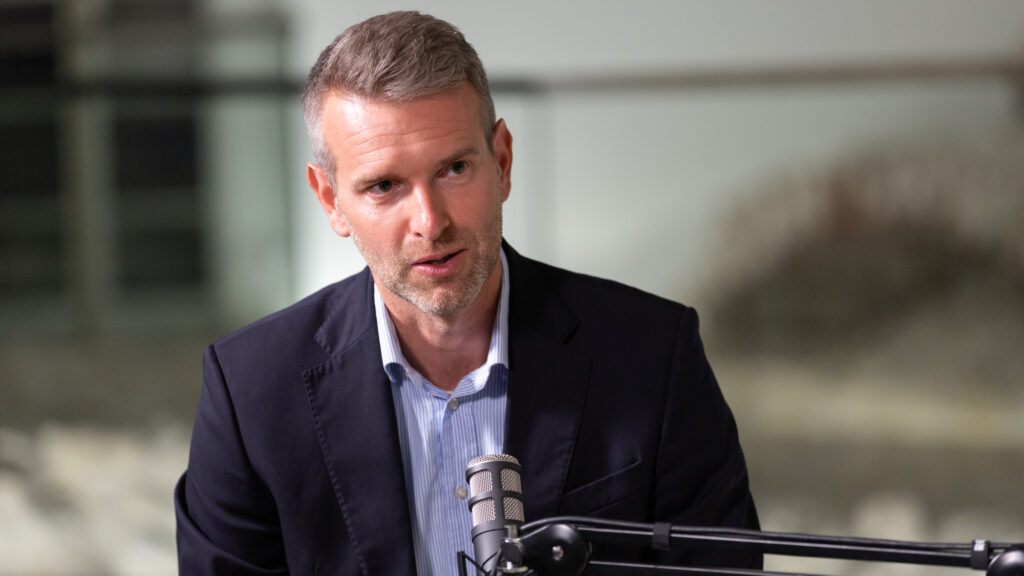
Finally, what is the structure of the Hungarian energy mix?
One third of the total energy mix is still oil-based, another third is gas-based, and the rest is electricity—nuclear and renewables. This is the current situation. I think one of the key strategies we can use to reduce gas exposure—and to substitute fossil fuels and natural gas with alternatives like geothermal, biomass, and potentially hydrogen—is electrification: increasing electricity consumption instead of gas and oil. We wouldn’t have to import energy from long distances. So if we would like to strengthen Hungarian energy sovereignty, then the solution is electrification and substituting fossil fuels with other sources. In the case of electricity, I think we have a clear strategy: nuclear and renewables, both are carbon neutral, and when the sun is not shining or the wind is not blowing, then for balancing purposes, batteries or gas-fired technologies should be in place. Natural gas is still part of the mix, but not for 24/7 consumption—only during peak hours. Currently, 40 per cent of electricity comes from nuclear power, and we are the world’s number one in solar energy generation. In the electricity mix, we have 25 per cent solar production. This is the highest in the world.
‘If we would like to strengthen Hungarian energy sovereignty, then the solution is electrification and substituting fossil fuels with other sources’
Is this data about individual users, or is it for company use?
This is at the country level. We have more than 300,000 households with residential photovoltaic systems, and also large industrial-scale PV parks. But altogether, if the sun is shining, we can fully supply Hungarian consumers with nuclear and solar power—we can even export. If the sun is not shining, then we have to find a solution to store the surplus energy in batteries. We need to use more geothermal, biomass, and biogas to reduce natural gas consumption. Actually, this year we started a large support scheme to subsidize these technologies, and I think it’s like a puzzle: we need many small pieces to achieve significant results.
So, in connection with the green transition, which is a requirement from the Commission, are we currently in a good phase of it?
Yes, actually, we have already reduced our emissions by 48 per cent. This is a significant drop, and we would like to continue on this path. We are quite confident that we will reach the 55 per cent reduction target by 2030, as expected by the European institutions. It’s not just because of the target itself, but because we think it’s good. It enhances Hungarian energy sovereignty and makes the entire energy system more sustainable—both financially and environmentally. This is a very delicate task, because if we do it focusing only on sustainability, then it could be very expensive, or it could harm supply security. That’s why we have to consider three aspects: supply security, price affordability and sustainability at the same time.
Watch the full podcast below:
Is reliance on Russian energy a choice or a necessity? | Danube Lectures
Listen on Spotify: https://open.spotify.com/episode/2vAR8mWNJAlHNDCz4gy5j4?si=yswr8gYmQ6eJmWyyqL2Shg 0:00 – Introduction 0:43 – Why is Hungary still dependent on Russian energy supplies? 4:17 – Foreign institutions claim that Hungary and Slovakia could purchase non-Russian oil and gas via alternative sources. Is that true? 5:40 – What alternative energy supply routes has Hungary already found?
Related articles:


